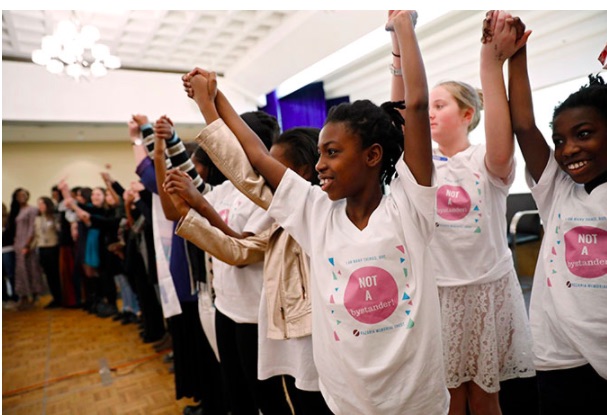TOLERANCE AND SOLIDARITY .
An article from UN Women
“Women and girls who live in rural areas are not at the danger of being left behind, they ARE being left behind,” said Lopa Banerjee, Director of the Civil Society Division at UN Women, opening the Youth Dialogue hosted on 17 March, at the 62nd Commission on the Status of Women. The Dialogue, focusing on the theme, “Leave No One Behind”, witnessed spirited discussions revolving around the challenges and opportunities in achieving gender equality and the empowerment of young women and girls living in rural communities, and was led by UN Women in collaboration with the UN Youth Envoy and nine civil society organizations.

Young activists gathered at the CSW62 Youth Dialogue on 17 March, 2018. Photo: UN Women/Ryan Brown
“As young people, what all of us need to understand is that using our voice doesn’t cost anything,” said Jaha Dukureh, anti-FGM activist from The Gambia, and now UN Women’s Regional Goodwill Ambassador for Africa, emphasizing on the importance of solidarity among the youth.
The event called attention to the structural barriers faced by young women and girls in rural communities and highlighted practical solutions in the form of recommendations for policy makers.
“We are the largest generation the world has ever seen. We are 1.8 billion strong,” said Jayathma Wickramanayake, the Secretary-General’s Envoy on Youth, moderating the inter-generational dialogue with six young activists working on various issues such as access to ICT, indigenous people’s rights, and rights of people living with disabilities.
One of the panellists, Edward Ndopu from the World Economic Forum, originally from South Africa, said, “the barrier [for young people] is not in participation, the barrier is to leadership. I come from a continent with the world’s largest youth demographic. But in the African continent, when we look at the people who represent us in office, the average age of Members of Parliament is between 65 and 70.”
Shelley Cabrera from the Continental Liaison for Indigenous Women of the Americas Network, another panellist, said, “As youth, we need to take a stance and pass on the torch to those who will follow.”
(Article continued in right column)
(Article continued from left column)
In a conversation with the youth, Phumzile Mlambo-Ngcuka, the Executive Director of UN Women, observed, “the first thing that worries me about the situation of young people and women is the normalization of exclusion. One challenge and responsibility of the UN is to address this normalization.” She urged young people to come together and form alliances for accelerating progress.
Throughout the day, youth participants, academics, experts and activists from rural and urban communities discussed a range of issues that impact rural youth, including health, violence, education, land rights and the environment, economic justice, and access to information and technology. A set of policy recommendations were presented in conclusion by the youth, which included: ensure access to free quality education – inclusive of digital literacy, human rights education and comprehensive sex education, ; ensure services are well-funded, survivor-centred, free, and accessible to young women, girls living and working in rural areas; increased opportunities that enable young women and girls and trans youth living and working in rural communities to meaningfully participate the labor market by investing in financial literacy programmes, providing training opportunities that lead to decent and meaningful work as well ability to unionize and to form cooperatives; adopt and enforce legislation that gives girls and young women equal inheritance rights, as well as rights to property and resources.
Responding to the recommendations, Ms. Mlambo-Ngcuka said, “the recommendations will be taken to the Chair of CSW and to negotiating delegates to inform the development of the Agreed Conclusions of the CSW62.” She also encouraged the participants to take these recommendations to their own communities and disseminate widely. She assured that UN Women will support its country offices in the dissemination and advocacy.
The Vice Minister of Family Affairs, Senior Citizens, Women and Youth from Germany, Ms. Elke Ferner, reiterated the vital role of the youth as agents of change and promised to work more closely with the Missions to include the voices of young rural women and girls in their delegations to CSW. Canada’s Senator from Manitoba, Ms. Marilou McPhedran, committed to take all the recommendations to the Prime Minister and to the Youth Advisory Council in Canada.
Rural women and girls routinely face exclusion in all spaces, and recognizing this, Jayathma Wickramanayake insisted on data collection as one of the main components for the achievement of Agenda 2030 for rural women and girls and said that systems must be put in place for shadow reporting on SDGs and youth in rural areas.
Wrapping up the event, UN Women’s Lopa Banerjee said, “This dialogue was conceived as a space where young women and girls from rural communities can discuss how they can thrive as leaders, not simply live, not survive: but thrive. Our work at UN Women will be to make sure that these community-led solutions, whether on education, on violence, on stigma-free comprehensive sexual education, or land rights, will be taken into account in the CSW62 agreed conclusions.”
This year’s Youth Dialogue followed an inter-generational civil society dialogue organized by UN Women and partners, which also diverse constituencies from around the globe to discuss what it would take to leave no woman or girl in any rural area behind in the achievement of the Sustainable Development Goals.